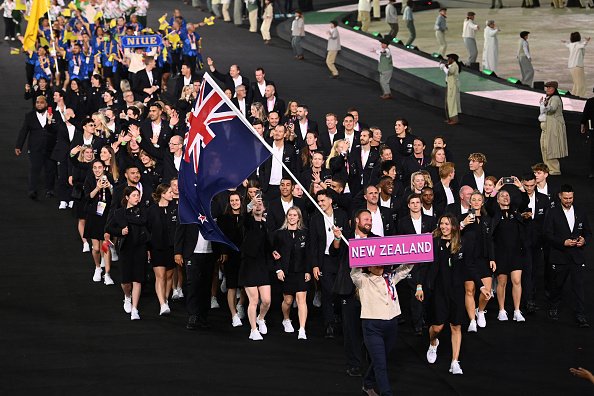
New Zealanders fortunate enough to take part in the Commonwealth Games opening ceremony at Alexander Stadium won’t soon forget the experience. Birmingham turned on a memorable ceremony full of humour, history, colour and life.
It told Birmingham’s story – those with links to the city who featured included William Shakespeare, Dr Samuel Johnson and Charlie Chaplin.
You can’t go far in Birmingham without running into a reminder of Peaky Blinders, the Netflix hit set in the city after World War I. There are huge Peaky Blinders billboards around the town, and plenty of flat caps and those distinguishing haircuts. During the ceremony, the games volunteers wore full Peaky Blinders outfits.
Alexander Stadium was visited by a massive bull – a nod to the city’s famous Bullring shopping centre, and the city’s industrial past featured. The Red Arrows provided an aerial display and there was plenty of music and colour throughout.
In an evening of excitement, there was a moving moment when Afghanistan human rights activist Malara Yousafzai addressed the spectators. She was barely a teenager in 2012 when she was shot in the face by the Taliban, annoyed at her public support of education for girls and women. Yousafzai has had quite a life, including a Nobel Peace Prize. She now lives in Birmingham with her family and was loudly applauded when she spoke during the opening ceremony.
The English generally rise to the occasion when putting on shows, and this opening ceremony was no exception. It showcased Birmingham – and England – superbly to a world TV audience estimated, perhaps optimistically, at 1.5 billion.
The heatwave that hit Britain last week has vanished and the weather for the opening ceremony was overcast and mild.
Birmingham, population 1.2 million, is said to be England’s most diverse city and these Games are being proudly proclaimed as the most diverse of the 22 that have been held since the first, in Hamilton, Ontario, in 1930.
There are 72 countries and territories being represented in Birmingham, with 5000 athletes competing in 20 sports.
The entry of the athletes was, as ever, a highlight. The large Australian team was first. New Zealand, proudly wearing black, was well represented and warmly welcomed. They were led by joint flag bearers Tom Walsh and Joelle King.
Both have great back stories. Walsh won a shot put silver as a young man in Glasgow in 2014 and was a gold medallist in 2018 on the Gold Coast. He also has Olympic and world championship medals in his CV.
Squash star King’s Commonwealth Games history stretches back even further. In 2010, when she was just 21, she won a women’s doubles gold and a mixed doubles silver in Delhi and was given the honour of carrying the New Zealand flag in the closing ceremony. There followed a singles bronze in 2014 than two golds and a bronze in 2018. King is one of New Zealand’s all-time Commonwealth Games greats and was clearly moved to be invited to help lead the team into the stadium.
Host broadcaster BBC devoted considerable time to the New Zealand team and featured an interview with Suzie Bates, a former national basketball rep, and now a senior member of the New Zealand women’s cricket team, competing in T20 in Birmingham. In a further nod to New Zealand, former cycling track star Alison Shanks later helped carry the Commonwealth Games flag into the stadium.
The appearance in the stadium of the massive England team – the final country to enter - not surprisingly drew huge crowd support and the noise level rose several notches in a spine-tingling moment.
There’s bubbling excitement about these Games. With two sports – netball and cricket – restricted to women, there are actually more gold medals at stake for women than men, and there has been an increase in events for athletes with a disability.
After Prince Charles rounded off the ceremony by declaring the Games open, thoughts turned to naturally to the sport itself. Let the Games begin.